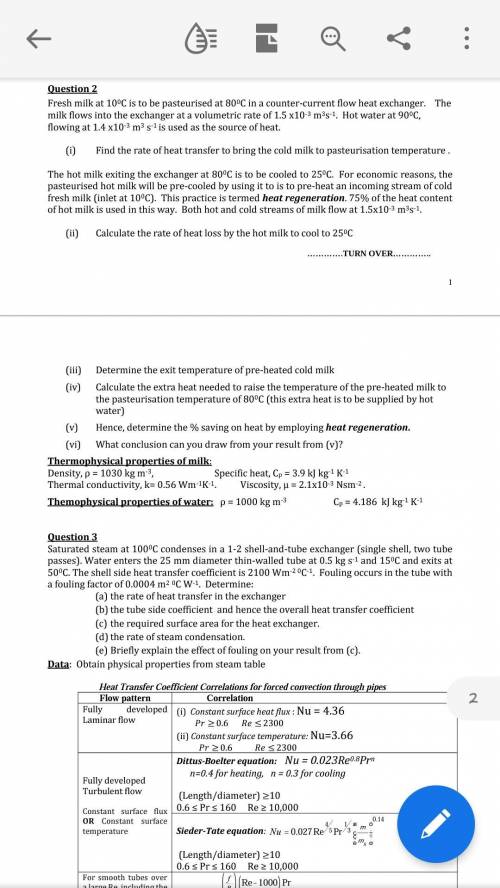
Engineering, 10.06.2020 01:57, deidrabenson72331
Fresh milk at 100C is to be pasteurised at 800C in a counter-current flow heat exchanger. The milk flows into the exchanger at a volumetric rate of 1.5 x10-3 m3s-1. Hot water at 900C, flowing at 1.4 x10-3 m3 s-1 is used as the source of heat. (i) Find the rate of heat transfer to bring the cold milk to pasteurisation temperature . The hot milk exiting the exchanger at 800C is to be cooled to 250C. For economic reasons, the pasteurised hot milk will be pre-cooled by using it to is to pre-heat an incoming stream of cold fresh milk (inlet at 100C). This practice is termed heat regeneration. 75% of the heat content of hot milk is used in this way. Both hot and cold streams of milk flow at 1.5x10-3 m3s-1. (ii) Calculate the rate of heat loss by the hot milk to cool to 250C (iii) Determine the exit temperature of pre-heated cold milk (iv) Calculate the extra heat needed to raise the temperature of the pre-heated milk to the pasteurisation temperature of 800C (this extra heat is to be supplied by hot water) (v) Hence, determine the % saving on heat by employing heat regeneration. (vi) What conclusion can you draw from your result from (v)?


Answers: 3
Other questions on the subject: Engineering

Engineering, 04.07.2019 18:10, johnthienann58
Thermal stresses are developed in a metal when its a) initial temperature is changed b) final temperature is changed c) density is changed d) thermal deformation is prevented e) expansion is prevented f) contraction is prevented
Answers: 2

Engineering, 04.07.2019 18:10, selenamr
Ifa component is made of two or more materials with different modulus of elasticity (e), it is called a composite member and we calculate the factor·n". mention the formula for calculating n". also, ifn> 1, explain what will happen to the 1. transformed. gi) ifn 1, what will happen to the material when transformed material when
Answers: 1

Engineering, 04.07.2019 18:10, QueenLife4869
Awall of 0.5m thickness is to be constructed from a material which has average thermal conductivity of 1.4 w/mk. the wall is to be insulated with a material having an average thermal conductivity of 0.35 w/mk so that heat loss per square meter shall not exceed 1450 w. assume inner wall surface temperature of 1200°c and outer surface temperature of the insulation to be 15°c. calculate the thickness of insulation required.
Answers: 3
Do you know the correct answer?
Fresh milk at 100C is to be pasteurised at 800C in a counter-current flow heat exchanger. The milk f...
Questions in other subjects:





Mathematics, 25.02.2020 21:48

Mathematics, 25.02.2020 21:48









